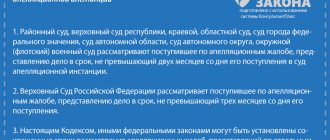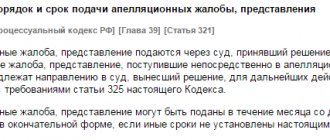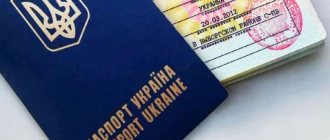Home / Complaints, courts, consumer rights / Litigation
Back
Published: September 28, 2018
Reading time: 8 min
3
974
A cassation appeal is intended to correct significant violations of substantive or procedural law that were committed by the courts during previous proceedings and that influenced the outcome of the case, resulting in a violation of the rights and freedoms, as well as the interests of a person.
- Who considers the complaint
- Submission and consideration procedure
- Submission deadline
- Review period
- What decisions can be made on a cassation appeal?
Who considers the complaint
When preparing a cassation appeal, a person should be guided by the following legislative norms:
- Resolution of the Plenum of the Supreme Court of 2012 No. 29 “On the application by courts of the norms of civil procedural legislation governing proceedings in the cassation court.”
- Civil Procedure Code of the Russian Federation Art. 386 .
According to Article 377 of the Code of Civil Procedure, a cassation appeal is not filed with the authority that made the contested decision, but directly with the court that will consider it. Cassation cases are considered by cassation courts. This may be the presidium of the Supreme Court, the regional and regional courts, the court of a federal city and the court of an autonomous region, as well as a district.
A cassation appeal can be sent against a decision of any court, except the Supreme Court: district, magistrates', and regional courts.
Within the framework of civil proceedings, the cassation instance is the third after the courts that heard the case and the courts of appeal. A cassation appeal is filed against a decision of a court of first or appellate instance or against both decisions made.
Complaints based on court rulings that have entered into force can be contested through cassation proceedings.
To file a cassation appeal, it is mandatory to go through the appeal stage, otherwise the court will not accept it for consideration.
It is especially worth noting that the purpose of filing a cassation appeal may be to change a court decision (of the first or appellate instance) or to cancel it. At the same time, the cassation court does not consider the case on its merits, it only evaluates the work of the judicial body.
Cassation authority. Concept and features
Every citizen has the right to judicial protection (Article 47 of the Russian Constitution). However, in practice, this possibility is not always realized as one of the parties to the dispute assumes.
Not all court decisions are fair for various reasons:
- insufficient qualifications of judges;
- incorrect interpretation of legislation by conflicting parties;
- providing the court with evidence that has no legal significance;
- incorrect legal assessment of the circumstances that are accepted as the legal basis of the claim, etc.
That is why the Civil Code (as well as other procedural norms) provided for the possibility of appealing a court decision, first in appeal, and then in cassation.
The judicial act of the first instance is reviewed on appeal (the provisions of Article 320 of the Code of Civil Procedure of Russia). That is, acts that have not yet entered into legal force can be revised. Cassation is the next step.
After an appeal, the decision takes effect immediately (unless the application is denied and the case is not reconsidered). Despite this, the legislator gives the interested party the opportunity to try again to appeal the decision through cassation procedure.
By cassation proceedings, jurisprudence understands the procedural activities of the relevant court, which makes it possible to review judicial acts that have entered into force if other methods of protection have been exhausted.
The main feature of the procedure is that only a decision that has already entered into force can be reviewed in cassation. If the decision has not entered into force, then the law requires the use of a different review procedure, depending on the circumstances.
In practice, the cassation instance has other features that must be taken into account when filing such an appeal:
- In case of satisfaction of the cassation appeal and subsequent revision of the decision that has gained force, the applicant has the right, on the contrary, to carry out enforcement proceedings if any actions have already been taken. For example, if funds were debited from his account, he has the right to demand the return of these funds. To do this, you will need to separately contact the bailiff service, the department that conducted the enforcement proceedings.
- If you miss the deadline for applying, it can be restored. The application is submitted to the Supreme Court of Russia (provisions of paragraph 2.2 of Article 376 of the Code of Civil Procedure of Russia). The judge of the Supreme Court, by his ruling, restores the term, but the chairman of such a court or his deputy may not agree with this act (clause 2.3 of Article 376).
- Not only a participant in the process, but also another person who can prove that his rights were affected by a previously issued act can file a cassation appeal. For example, if such a person was not summoned to the courts of previous instances at all, but his rights are directly affected by the issued act.
- An appeal against an appeal decision is preliminarily considered by a single judge, without summoning the parties to the hearing. But in this order, the judge only decides whether to accept the complaint for execution or not. If the complaint is accepted for proceedings, the parties will be summoned to a court hearing and the case will be considered by a panel of judges.
- New evidence will not be accepted. The judge must decide whether the old ones were correctly applied and analyzed, whether the legal norms were correctly used and interpreted.
In essence, cassation is another way to cancel or revise what is, in the applicant’s opinion, an unlawful decision and to achieve a fairer trial.
Submission and consideration procedure
The procedure for filing and considering a cassation appeal involves going through three main stages:
- A statement of claim is filed with the cassation authority.
- A court hearing is scheduled , and the court gets acquainted with the case materials.
- A decision is made on the cassation appeal.
The cassation appeal must comply with the legal requirements that apply to it under Art. 378 Code of Civil Procedure of the Russian Federation. It must contain the following information:
- The name of the cassation authority where the complaint is filed.
- Full name of the citizen and residential address.
- Status of the person in the case (plaintiff or defendant).
- Information about all participants in the trial.
- Information about all court decisions that were previously made by the courts.
- Information about what rights were violated by court decisions with references to the legal framework.
- Request from the person who filed the complaint to the court.
- List of documents.
- Personal signature of the person who filed the complaint or his representative.
The decisions of the courts of first and second instance must be attached to the cassation.
The complaint is submitted in the number of copies according to the number of participants in the process. The complaint is accompanied by a receipt with the paid state duty and, if necessary, documents giving the right to benefits when paying.
In Art. 376 of the Code of Civil Procedure emphasizes that citizens can file complaints with the cassation authorities if by this point they have exhausted other opportunities available to them to protect their rights and interests.
The procedure for collecting state fees for filing a cassation is prescribed in Art. 333.19 of the Internal Revenue Code. Its amount is 50% of the amount of the fee for non-property claims.
Persons in claims for divorce, individuals in appealing criminal cases, if the accuracy of the calculation of property damage is disputed, are exempt from paying tax. Also, accomplices and third parties who act on the same side as the plaintiff do not pay the state fee.
The cassation appeal must be returned to the person without additional proceedings in the following cases:
- If it does not contain the data provided for in Art. 378 Civil Procedure Code .
- If it was filed by a person who did not have the right to file a cassation.
- If there is a request from the applicant to withdraw or return the complaint.
- If the rules of territorial jurisdiction were violated.
- If the deadlines for filing a cassation were missed (if a court order to restore the deadlines was not attached to the complaint).
In these situations, the complaint must be returned without trial on the merits within 10 days after its receipt by the judicial authority.
The deadline has been set for appealing to the leadership of the Supreme Court of the Russian Federation to review a specific case
Legal informs about the limitation of the period for appealing to the Chairman of the Supreme Court of the Russian Federation or his deputy in the event of a refusal to transfer a cassation appeal for consideration by the judicial collegium of the Supreme Court of the Russian Federation within the two-month period for a cassation appeal
[1]
.
The procedure for cassation appeal in the Supreme Court of the Russian Federation of judicial acts on economic disputes provides that the parties, within two months after the district court makes a decision on the case, can file a cassation appeal with the Supreme Court of the Russian Federation (Article 291.1, Part 1 of Article 291.2 of the Arbitration Procedure Code of the Russian Federation) .
A judge of the Supreme Court of the Russian Federation examines the complaint within two months (three if the case is requested), after which he issues either a ruling to transfer the case for consideration by the judicial panel of the RF Armed Forces, or to refuse such transfer (Part 7 of Article 291.6 of the Arbitration Procedure Code of the Russian Federation) .
If the transfer of the case for consideration by the board is refused, the Chairman of the Supreme Court of the Russian Federation or his deputy has the right to disagree with the judge’s ruling, cancel it by his decision and transfer the case for consideration to the board (Part 8 of Article 291.6). At the same time, the legislation on legal proceedings in arbitration courts does not establish either the procedure or deadlines for making such a determination.
In practice, the Chairman and his deputy use this authority when one of the parties to the case approaches them with a request. The deadline for a party to file such a request (complaint) is also not established.
This regulation led to the fact that a party could appeal to the Chairman of the RF Supreme Court or his deputy a long time after the refusal to transfer the case for consideration by the board, and the Chairman could consider such a complaint for an unlimited amount of time.
Legal position of the Constitutional Court of the Russian Federation
The Constitutional Court of the Russian Federation clarified that Part 8 of Art. 291.6 of the Arbitration Procedure Code of the Russian Federation, in its constitutional and legal meaning, suggests that “an appeal from interested persons to the Chairman of the Supreme Court of the Russian Federation, his deputy with a request to disagree with the ruling of a judge of the Supreme Court of the Russian Federation on the refusal to transfer a cassation appeal, presentation for consideration at a court session of the Judicial collegium of the Supreme Court of the Russian Federation and make a ruling on its cancellation and the commission of this procedural action is possible only in the form of a properly executed cassation appeal, presentation and within the two-month period established by law for a cassation appeal
; at the same time, the time for consideration of a cassation appeal or presentation in the cassation instance of the Supreme Court of the Russian Federation should not be taken into account when calculating this period.”
The Constitutional Court of the Russian Federation indicated that a similar approach was previously developed within the framework of regulating the procedure for filing complaints with the Supreme Court of the Russian Federation, provided for by the Civil Procedure Code of the Russian Federation.
What to think about, what to do
At the moment, no changes have been adopted to the Arbitration Procedure Code of the Russian Federation that would regulate the procedure for appealing to the Chairman of the RF Supreme Court or his deputy. However, the Supreme Court of the Russian Federation in its activities is already guided by the approach determined by the Constitutional Court of the Russian Federation.
In this regard, the following must be taken into account:
- A two-month period is actually set for the preparation of two complaints: directly a cassation appeal and a complaint to the Chairman of the Supreme Court of the Russian Federation, his deputy for a judge’s decision to refuse to transfer the cassation appeal for consideration by a judicial panel. Consequently, when preparing and filing a cassation appeal, it is necessary to calculate the time in such a way that in case of refusal, there is sufficient time left for filing the complaint with the Chairman or his deputy.
- At present, despite the absence in the Tax Code of the Russian Federation of a direct rule establishing the obligation to pay state duty, due to the fact that the Constitutional Court of the Russian Federation has equated in legal status a complaint against a judge’s ruling to a cassation appeal, when filing a complaint against a judge’s ruling in the Supreme Court The Russian Federation requires the presentation of evidence of payment of the state fee for its consideration by the Chairman of the Supreme Court of the Russian Federation or his deputy in the amount established for the consideration of a cassation appeal.
- If the deadline has already been missed, applicants have the right to petition for the restoration of the deadline with reference to the establishment of deadlines only by the Resolution of the Constitutional Court of the Russian Federation dated July 12, 2018 (Article 291.2, Article 117 of the Arbitration Procedure Code of the Russian Federation), the content of which runs counter to the previously applied practice of the Supreme Court of the Russian Federation, and the Constitutional Court of the Russian Federation itself (rulings of June 27, 2017 No. 1358-O, 1387-O, 1388-O, dated September 28, 2017 No. 2042-O).
[1] Resolution of the Constitutional Court of the Russian Federation dated July 12, 2018 No. 31-P.
Submission deadline
The deadline for filing a cassation appeal is six months from the date of the appealed decision. This period begins to be calculated from the day following the day the court decision is made.
Moreover, if in the appellate court only the operative part of the ruling was announced, and the announcement of the reasoned part was postponed for a period of no more than 5 days, then due to this period, the limitation period for filing a cassation statement is not extended (according to Article 199 of the Code of Civil Procedure).
The deadline for filing cassation complaints is not considered missed if they are sent by mail the day before the expiration of the deadline for cassation (according to Part 3 of Article 108 of the Code of Civil Procedure of the Russian Federation).
In this case, the date of filing the cassation is determined by the postmark on the envelope and the receipt.
If necessary, a person may restore the deadline for filing a cassation appeal if the person has valid reasons for missing the deadline . This could be a serious illness, helplessness, or other circumstances that were beyond the person’s control and did not allow him to file a cassation appeal on time. To restore missed deadlines, you must submit a corresponding application to the court. In order for the court to take into account the reasons indicated by the person in the application, it is necessary to document the stated circumstances.
A cassation appeal filed after six months is subject to return to the person who filed it without consideration on the merits, unless a court decision to restore the deadline is attached to it.
It is worth considering that an application for restoration of deadlines can be submitted no later than one year after the appeal decision is made. Outside the specified period, the application will not be considered.
Review period
The deadlines for consideration of cassation complaints are contained in Art. 382. Civil Procedure Code. Here are the time frames for reviewing a complaint:
- no more than 1 month, if the case has not been requested (the court can become familiar with the circumstances on the basis of the facts stated in the application, or on the basis of the materials of the requested case);
- no more than 2 months if the case was requested.
Complaints filed with the Supreme Court are considered within a period not exceeding 2 months (3 months if the case was filed).
If necessary, the Chairman of the Supreme Court of the Russian Federation and his deputy have the right to extend the time frame for considering a complaint, but not more than for two months.
Cassation courts are obliged to transmit information about the consideration of the case to all participants in the process. During the court hearing, the persons who are parties to the case and their representatives participate.
The procedure of the cassation instance
The procedure for considering a cassation appeal in a civil case will depend on which court is actually considering such a complaint.
And this, in turn, depends on the category of the case. In practice, citizens most often appeal by cassation against decisions that could not be reviewed as part of the appeal. In any case, the first step for the applicant is to prepare a cassation appeal, which is submitted to the presidium of the cassation court of the relevant region.
In general, the cassation appeal procedure is as follows:
- The situation is analyzed. It is important to determine whether there are grounds for appealing to the cassation authority. Most often, it is enough to go through the appeal stage.
- A complaint is being prepared. It indicates all the necessary details and circumstances. It is also necessary to attach a complete package of documentation, including a receipt for payment of the fee and the previous decision.
- A complaint is filed to the presidium of the court that made the decision (unless another procedure is expressly provided for by law) or to the Supreme Court of the Russian Federation.
- The complaint is being considered by the court. Based on the results of its consideration, the judge refuses to review the civil case, or it is transferred for consideration at a hearing.
Further, if the case is transferred for consideration, the court will notify all participants in the process. They will be sent a court ruling about this. Next, the case, along with the available materials, is transferred to the appropriate cassation court.
Attention! The date of consideration is set taking into account the expected possibility (the principle of reasonable time) of the participants in this dispute to attend the trial (clause 1 of Article 385 of the Code of Civil Procedure of the Russian Federation). But the failure of persons to appear will not be an obstacle to the consideration of the issue (the provisions of Article 385 of the Code of Civil Procedure of Russia).
The case is then heard in the cassation court. In this case, all interested parties can take part in the hearing. The judge sets out the circumstances described in the case materials, as well as the arguments specified in the complaint (Article 386 of the Code of Civil Procedure of Russia). Persons who appeared at the trial have the right to give their explanations (Article 386 of the Code of Civil Procedure of Russia).
The result of the court hearing is a decision of the presidium or a determination of the Judicial Collegium of the Supreme Court. In general, the issuance of an act is carried out according to the rules prescribed in the provisions of Art. 194 and 193 Code of Civil Procedure of Russia.
Subsequently, the adopted court decision - a decree or rulings - must be sent to all persons involved in the process.









